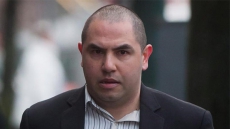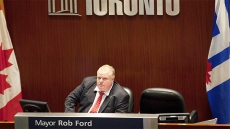OTTAWA - Forcing TV service providers to offer their customers television channels on a pick-and-pay basis would be a waste of time, says a new study.
The C.D. Howe Institute report to be released today says ever-changing technology will soon put viewers squarely in the driver's seat, allowing them to choose everything they watch one program at a time.
And it suggests it would be better for regulators to determine whether broadcasters should continue to be required to fund the production of Canadian content.
The study also opposes the idea of forcing new video-distribution services, such as Netflix, to pay into funds that subsidize that content.
Entitled "Let the Market Decide: The Case Against Mandatory Pick-and-Pay," the study comes as the Canadian Radio-television and Telecommunications Commission conducts a comprehensive review of how consumers get their TV programming and how they pay for it.
The Harper government has been promoting the pick-and-pay model as good for consumers.
And the CRTC has been debating how that might work, suggesting an array of options for getting there. One suggestion would allow people to buy only the individual channels they want to watch, on top of a pared-down, price capped basic service that would include either mainly Canadian channels or a mix of Canadian and U.S. channels that would otherwise be available free over the air.
"Any proposals to mandate such 'pick-and-pay' channel choices are deeply misguided and are largely an exercise in futility in the light of the technological revolution that is unfolding in the communications sector," said C.D. Howe.
"Any regulation would become irrelevant at best, harmful at worst."
During two weeks of hearings which finished last week, one of the industry's big players acknowledged that it expects a sea change in how people get their TV programming.
Rogers told a CRTC panel that it expects traditional TV will be delivered almost exclusively over the Internet, possibly within 10 or 15 years.
But it rejected the idea of allowing viewers to pay for television channels strictly one at a time and said the regulator should not put a cap on the price of smaller, basic TV packages.
The CRTC has asked Canadians to consider whether it should cap the cost of basic service at between $20 and $30 a month.
Both Rogers and Bell said regulatory reforms are needed to encourage the production of more high-quality Canadian content, but urged the CRTC not to leave them at a competitive disadvantage with new online video services such as Netflix.
The C.D. Howe Institute questions whether consumers will want a basic service at all and says market forces and technology will likely encourage more people to "cut the cord."
"The trend is away from traditional 'push' programming to 'pull' consumer preference, where consumers have choices in what, when and where to watch video content," said the institute.
The road to change — and the CRTC's ability to try and control it — took a negative turn this week when Netflix refused to turn over sensitive corporate information to the regulator, questioning its very authority over Internet-based video streaming companies in the process.
Netflix and other so-called "over-the-top" video services have rejected proposals by some provincial governments, traditional broadcasters and cultural groups that would see them regulated and effectively forced to pay into funds that prop up Canadian television production.
They have been backed by the Harper government, which has stated clearly that it won't allow the CRTC to enact regulations that would created a so-called "Netflix tax."





